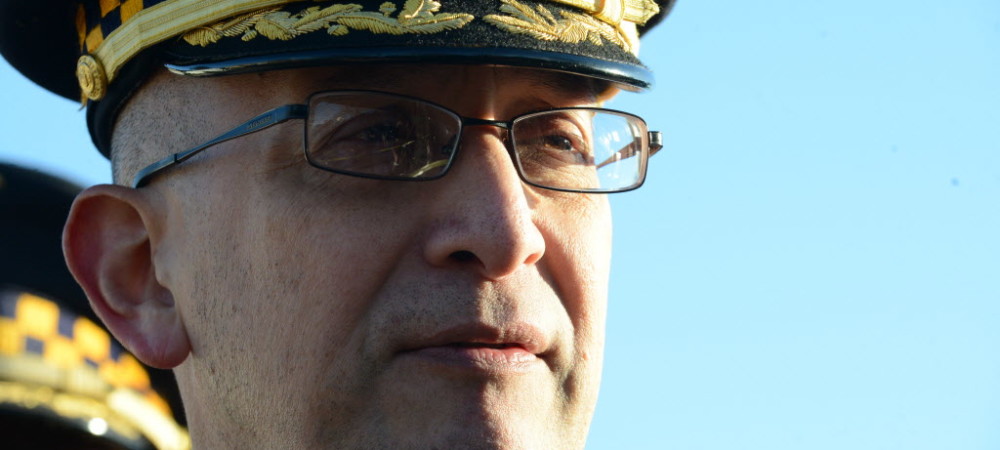
Former interim Supt. John Escalante. | Ashlee Rezin / Sun-Times
Escalante cut cop’s suspension
Published April 19, 2016
By TIM NOVAK and CHRIS FUSCO
Staff Reporters
Two months ago, then-interim Chicago police Supt. John Escalante handed down a one-year suspension to a detective involved in the botched investigation that cleared former Mayor Richard M. Daley’s nephew in David Koschman’s death.
But Escalante later signed off on a deal that will allow the detective, Nicholas Spanos, to shave as much as 10 months from that suspension, according to a city inspector general’s report released Monday.
Spanos “has exercised an ‘options’ discipline approved by” Escalante, Inspector General Joseph Ferguson wrote under which the detective “will be taking two calendar months of the suspension as unpaid leave and forfeiting accrued paid leave time . . . to, in essence, buy back the remaining 10 months of the one-year suspension.”
Ferguson said in the report he recommended that Escalante fire Spanos, but, instead, Spanos will be back on the job “shortly.”
Escalante is now new police Supt. Eddie Johnson’s first deputy, the second highest-ranking position in the department.
Mayor Rahm Emanuel’s Police Accountability Task Force recommended last week that Johnson develop a policy on when cops can use “options” discipline, which allows them to cash in accrued time to lessen their unpaid suspensions. Ferguson was on that task force.
Reacting to Spanos’ deal, Johnson “has directed a full review” of the policy that allows police officers to effectively buy their way out of suspensions, police spokesman Anthony Guglielmi said. Under that policy, Spanos — a 20-year veteran — will be off without pay for 60 days and is cashing in 1,400 hours of accrued compensation.
“As part of the department’s continued commitment to restoring public trust and accountability, Supt. Johnson believes it is critically important to strengthen CPD’s system of accountability so it has the rigor to effectively discipline officers when wrongdoing occurs,” Guglielmi said.
Spanos and his partner, Detective James Gilger, reinvestigated the Koschman case, which was closed in March 2011 without charges being brought against Daley nephew Richard J. “R.J.” Vanecko. A Chicago Sun-Times investigation prompted the appointment of a special prosecutor, Dan K. Webb, which led to Vanecko pleading guilty in January 2014 to involuntary manslaughter.
Webb said he considered charging six officers, including Spanos, with obstruction of justice or official misconduct but decided he didn’t have enough evidence to convict them. Former Supt. Garry McCarthy and Emanuel directed Ferguson to investigate whether any police officers should face departmental discipline.
In December, Ferguson recommended that Escalante fire three officers — Gilger, Spanos and Lt. Denis P. Walsh — and “impose discipline up to and including discharge” against the others: Chief of Detectives Constantine “Dean” Andrews, Cmdr. Joseph Salemme and Sgt. Sam Cirone.
Under city ordinance, Ferguson can’t identify the officers by name. The Sun-Times is identifying them based on details in Ferguson’s report and other documents.
Escalante agreed to fire Gilger and Walsh, according to Ferguson, but both retired, avoiding termination.
Escalante planned to impose one-year suspensions against Andrews, Salemme, Cirone and Spanos, Ferguson wrote. But Andrews and Salemme retired days after Ferguson made his recommendations. Cirone, who is fighting his suspension, and Spanos aren’t old enough to retire.
Ferguson found that Gilger and Spanos, along with their supervisors Cirone, Salemme and Andrews:
• “Failed to perform a competent investigation” and “failed to draft a truthful and accurate closing supplementary report,” which omitted “a witness account of events that was in direct conflict with the officers’ view of the case” and failed to mention that original 2004 Koschman homicide file had gone missing. The report also contained a statement that Koschman yelled “F— you! I’ll kick your ass!” at Vanecko when, in fact, “there was no support for this quote.”
• “Improperly recommended and approved closure of the case” even though “there was sufficient information to support Vanecko’s arrest.”
• “Failed to seek a charging decision” from the Cook County state’s attorney despite “having, for the first time, identified Vanecko as the offender.”
Additionally, Ferguson criticized Andrews and Cirone for discussing the Koschman investigation using their personal emails, which “do not have the security required for the conduct of official CPD business.”
Andrews also “provided evasive or misleading statements” to Ferguson’s staff, according to the report, which doesn’t explain those statements.
Ferguson said he recommended firing Walsh in part because he didn’t file a report with the department’s Internal Affairs Division in January 2011 when Walsh discovered “that the original Koschman homicide file was missing.” Walsh also “failed to timely report to IAD the later discovery of the missing Koschman homicide file” in June 2011. Walsh later took the file to his home “with no legitimate work purpose.”
Ferguson also noted that Walsh remained involved in the 2011 reinvestigation “despite a superior’s directive” that he play no role in the case, which had been reassigned to Gilger and Spanos, who weren’t under his supervision.


